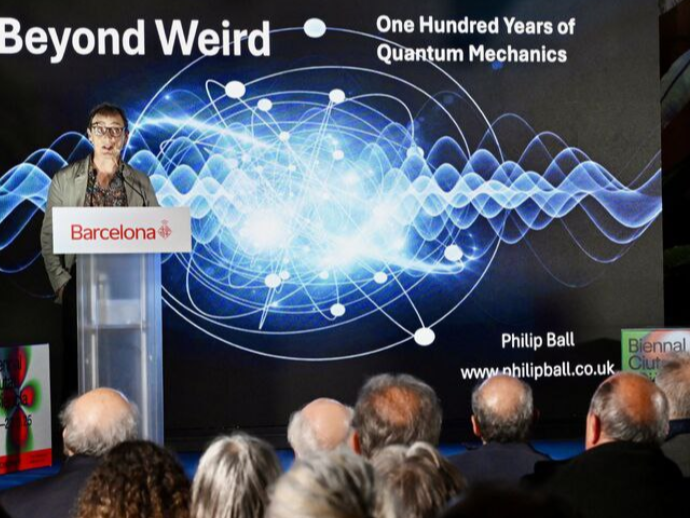The NAT Award ceremony kicks off the 4th City and Science Biennial
Philip Ball has been the winner of the 8th edition of the NAT Award, which is promoted by the Natural Sciences Museum to distinguish people or institutions that have contributed a new perspective to the dissemination of natural sciences. The award was granted at the Hivernacle in the Ciutadella Park, and has become the first event of the fourth edition of the Biennial City and Science, which is held simultaneously in Barcelona and Madrid until November 23, and which will be extended to Mexico (from November 29 to December 7) within the framework of the Guadalajara International Book Fair (FIL).
Ball, born in Newport (United Kingdom), has a degree in chemistry from the University of Oxford and a doctorate in physics from the University of Bristol. He is currently a member of the Department of Chemistry at University College London and, in terms of dissemination, is editor of the magazine Nature and a contributor to The New Scientist. He has been recognized for his exceptional ability to communicate complex ideas in an accessible and creative way and for the wide variety of disciplines he covers: from quantum physics to music, including biology, history and philosophy.
Institucional representation
During the event, the deputy mayor for Economy, Housing, Finance and Tourism, Jordi Valls, highlighted “the importance of scientific dissemination as a tool to connect with people and democratize knowledge and thus strengthen democracy”. Valls acknowledged that the Biennial, which is just beginning, “is the most important high-profile event in the city, and this year especially with a theme like quantum, which is already 100 years old, and which has helped shape the 21st century and will continue to do so in the future. That is why quantum is one of the strategic sectors for Barcelona, as set out in the Strategic Plan for Science and Innovation 2024-2027 and the Barcelona Innovation Coast strategy. The city's scientific ecosystem has large infrastructures dedicated to the study of quantum phenomena, such as the Barcelona Supercomputing Center (BSC), the Institute of Photonic Sciences (ICFO) and the Institute of High Energy Physics (IFAE)”.
Nat Award
The Nat Prize is an award endowed with 5.000 euros, which recognizes people or institutions that have become benchmarks for their way of looking at and explaining science, because they have promoted vocations in all disciplines of the natural sciences and because they have contributed in a very outstanding way to the conservation of nature. It consists of a piece specially designed by the prestigious sculptor Antoni Llena. Previous winners of the Nat Prize have been: Frans de Waal, Elisabeth Rasekoala, Nalini Nadkarni, Enric Sala, Itsaso Vélez del Burgo and Ann Druyan
The Jury of the Nat Prize is formed by:
• Mònica Artigas, journalist, deputy director of the magazine area of National Geographic.
• Carlota Bruna, influencer, activist for the environment and animal rights.
• David Bueno, director of the Chair of Neuroeducation at the University of Barcelona.
• Carles Lalueza, director of the Museum of Natural Sciences of Barcelona, and researcher at the Institute of Evolutionary Biology of Barcelona.
• Gemma Marfany, professor of Genetics at the University of Barcelona.
• Juli Peretó, professor of Biochemistry and Molecular Biology at the University of València.

